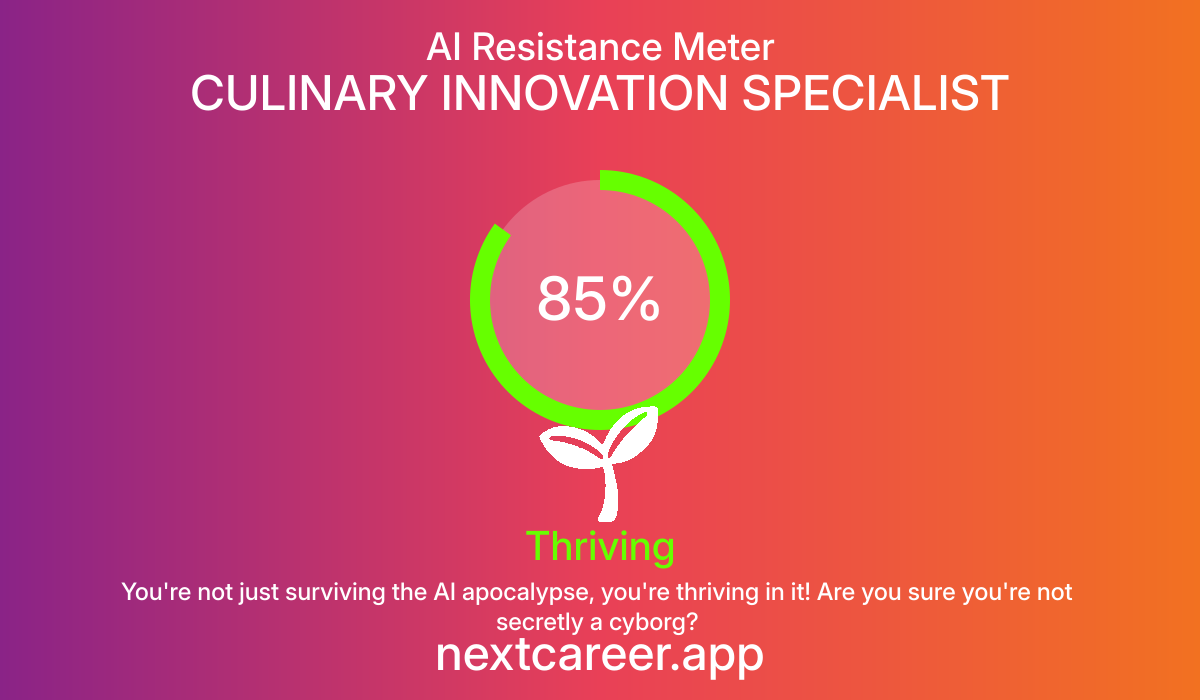AI Resistance Analysis
CULINARY INNOVATION SPECIALIST
CULINARY INNOVATION SPECIALIST
AI Resistance Score
AI Resistance Meter
Thriving
CULINARY INNOVATION SPECIALIST
You're not just surviving the AI apocalypse, you're thriving in it! Are you sure you're not secretly a cyborg?
The role of a Culinary Innovation Specialist involves a unique blend of creativity, cultural understanding, and sensory experiences that are less likely to be fully replicable by AI, particularly in the near to medium-term. While AI can assist in analyzing trends and optimizing recipes based on data, the emotional and cultural nuances of culinary arts give humans a significant edge.
The role of a Culinary Innovation Specialist involves a unique blend of creativity, cultural understanding, and sensory experiences that are less likely to be fully replicable by AI, particularly in the near to medium-term. While AI can assist in analyzing trends and optimizing recipes based on data, the emotional and cultural nuances of culinary arts give humans a significant edge.
Key Factors
- Cognitive Tasks: Requires creativity and complex problem-solving regarding flavor combinations and culinary trends.
- Emotional Intelligence: Engages with customers, chefs, and other stakeholders, requiring a deep understanding of emotions and cultural contexts.
- Physical Skills: Involves hands-on cooking techniques that AI and robotics can assist with but not fully replicate.
- Creative Thinking: Essential for innovation in food design, flavor profiles, and presentation.
Human Advantages
- Deep understanding of diverse culinary traditions and cultural nuances
- Ability to innovate and create unique dishes with emotional storytelling
- Sensory skills: taste, smell, and visual presentation that enhance dining experiences
AI Vulnerabilities
- Data-driven recipe generation
- Predictive analysis of food trends
- Basic food preparation automation
Recommended Actions
- Develop skills in data analytics to work alongside AI tools effectively.
- Emphasize storytelling in culinary creations to cultivate a unique brand identity.
- Stay updated on emerging food technology and sustainability trends to remain competitive.
- Foster interdisciplinary collaborations with technologists to innovate new culinary experiences.
In the near term, AI will likely assist Culinary Innovation Specialists by offering data analytics and optimization tools to streamline development processes and enhance efficiency. However, culinary arts inherently involve human emotion, cultural expression, and sensory experiences that may not be fully replicable by machines. In the long term, while AI may handle more routine tasks and assist in concept development, the role will continue to evolve, focusing more on the storytelling aspect of cuisine and exploring culinary experiences that connect with cultural and emotional dimensions. This leads to broader roles in culinary innovation that intertwine technology with personal touch, such as interactive dining experiences or sustainable culinary practices.

Why Calculate AI Resistance?
Understanding how AI-resistant your career is becoming increasingly important in today's rapidly evolving job market. Our analysis combines multiple factors including required human skills, technological adaptability, and future industry projections to give you a comprehensive view of your career's sustainability.